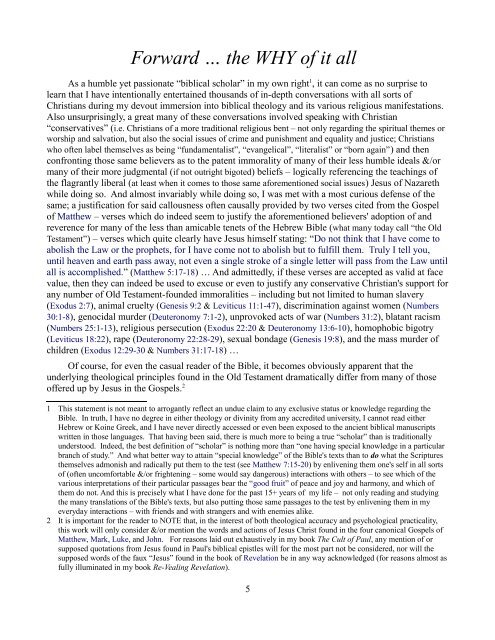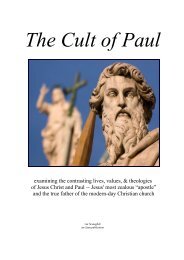Jesus Christ - a most Holy Heretic
An illuminating (and biblically exhaustive) examination of the little-known truth that Jesus Christ was not so much a supporter of the Old Testament laws of his day as he was a radically thorough reformer thereof
An illuminating (and biblically exhaustive) examination of the little-known truth that Jesus Christ was not so much a supporter of the Old Testament laws of his day as he was a radically thorough reformer thereof
Create successful ePaper yourself
Turn your PDF publications into a flip-book with our unique Google optimized e-Paper software.
Forward … the WHY of it all<br />
As a humble yet passionate “biblical scholar” in my own right 1 , it can come as no surprise to<br />
learn that I have intentionally entertained thousands of in-depth conversations with all sorts of<br />
<strong>Christ</strong>ians during my devout immersion into biblical theology and its various religious manifestations.<br />
Also unsurprisingly, a great many of these conversations involved speaking with <strong>Christ</strong>ian<br />
“conservatives” (i.e. <strong>Christ</strong>ians of a more traditional religious bent – not only regarding the spiritual themes or<br />
worship and salvation, but also the social issues of crime and punishment and equality and justice; <strong>Christ</strong>ians<br />
who often label themselves as being “fundamentalist”, “evangelical”, “literalist” or “born again”) and then<br />
confronting those same believers as to the patent immorality of many of their less humble ideals &/or<br />
many of their more judgmental (if not outright bigoted) beliefs – logically referencing the teachings of<br />
the flagrantly liberal (at least when it comes to those same aforementioned social issues) <strong>Jesus</strong> of Nazareth<br />
while doing so. And al<strong>most</strong> invariably while doing so, I was met with a <strong>most</strong> curious defense of the<br />
same; a justification for said callousness often causally provided by two verses cited from the Gospel<br />
of Matthew – verses which do indeed seem to justify the aforementioned believers' adoption of and<br />
reverence for many of the less than amicable tenets of the Hebrew Bible (what many today call “the Old<br />
Testament”) – verses which quite clearly have <strong>Jesus</strong> himself stating: “Do not think that I have come to<br />
abolish the Law or the prophets, for I have come not to abolish but to fulfill them. Truly I tell you,<br />
until heaven and earth pass away, not even a single stroke of a single letter will pass from the Law until<br />
all is accomplished.” (Matthew 5:17-18) … And admittedly, if these verses are accepted as valid at face<br />
value, then they can indeed be used to excuse or even to justify any conservative <strong>Christ</strong>ian's support for<br />
any number of Old Testament-founded immoralities – including but not limited to human slavery<br />
(Exodus 2:7), animal cruelty (Genesis 9:2 & Leviticus 11:1-47), discrimination against women (Numbers<br />
30:1-8), genocidal murder (Deuteronomy 7:1-2), unprovoked acts of war (Numbers 31:2), blatant racism<br />
(Numbers 25:1-13), religious persecution (Exodus 22:20 & Deuteronomy 13:6-10), homophobic bigotry<br />
(Leviticus 18:22), rape (Deuteronomy 22:28-29), sexual bondage (Genesis 19:8), and the mass murder of<br />
children (Exodus 12:29-30 & Numbers 31:17-18) …<br />
Of course, for even the casual reader of the Bible, it becomes obviously apparent that the<br />
underlying theological principles found in the Old Testament dramatically differ from many of those<br />
offered up by <strong>Jesus</strong> in the Gospels. 2<br />
1 This statement is not meant to arrogantly reflect an undue claim to any exclusive status or knowledge regarding the<br />
Bible. In truth, I have no degree in either theology or divinity from any accredited university, I cannot read either<br />
Hebrew or Koine Greek, and I have never directly accessed or even been exposed to the ancient biblical manuscripts<br />
written in those languages. That having been said, there is much more to being a true “scholar” than is traditionally<br />
understood. Indeed, the best definition of “scholar” is nothing more than “one having special knowledge in a particular<br />
branch of study.” And what better way to attain “special knowledge” of the Bible's texts than to do what the Scriptures<br />
themselves admonish and radically put them to the test (see Matthew 7:15-20) by enlivening them one's self in all sorts<br />
of (often uncomfortable &/or frightening – some would say dangerous) interactions with others – to see which of the<br />
various interpretations of their particular passages bear the “good fruit” of peace and joy and harmony, and which of<br />
them do not. And this is precisely what I have done for the past 15+ years of my life – not only reading and studying<br />
the many translations of the Bible's texts, but also putting those same passages to the test by enlivening them in my<br />
everyday interactions – with friends and with strangers and with enemies alike.<br />
2 It is important for the reader to NOTE that, in the interest of both theological accuracy and psychological practicality,<br />
this work will only consider &/or mention the words and actions of <strong>Jesus</strong> <strong>Christ</strong> found in the four canonical Gospels of<br />
Matthew, Mark, Luke, and John. For reasons laid out exhaustively in my book The Cult of Paul, any mention of or<br />
supposed quotations from <strong>Jesus</strong> found in Paul's biblical epistles will for the <strong>most</strong> part not be considered, nor will the<br />
supposed words of the faux “<strong>Jesus</strong>” found in the book of Revelation be in any way acknowledged (for reasons al<strong>most</strong> as<br />
fully illuminated in my book Re-Vealing Revelation).<br />
5

















